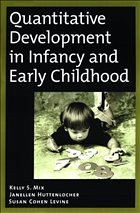The aim of this book is to define and discuss the key issues raised by new findings in the study of quantitative development. One basic question addressed is how the abilities reported in infants and young children relate to later development. In some accounts, one is left with the impression that infants possess all the fundamental skills that make up mature quantitative reasoning. According to this view, subsequent development seems to consist of little more than the gradual expression of these skills in increasing complex and explicit tasks. This is a major departure from previously held views of quantitative development, such as that of Piaget. To evaluate these new claims, authors will first review the abilities attributed to infants and then define the parameters of early childhood competiencies. Comparing the two developmental periods, the authors will evaluate the finding, discuss the transition between these age periods, and offer a framework for understanding later development of quantitative skills, such as counting and calculation. Underlying the argument throughout will be an examination of the nativist versus empiricist debate that has taken center stage in infancy research.
Review quote:
This book not only provides a useful overview of the work carried out thus far in this popular and important domain, it also gives those with a seasoned interest in these matters a fresh and thought-provoking view of familiar material. Their ideas make much sense of hitherto conflicting evidence and deserve to be heard by all with an interest in this field of development.
The aim of this book is to define and discuss the key issues raised by new findings in the study of quantitative development. One basic question addressed is how the abilities reported in infants and young children relate to later development. In some accounts, one is left with the impression that infants possess all the fundamental skills that make up mature quantitative reasoning. According to this view, subsequent development seems to consist of little more than the gradual expression of these skills in increasing complex and explicit tasks. This is a major departure from previously held views of quantitative development, such as that of Piaget. To evaluate these new claims, authors will first review the abilities attributed to infants and then define the parameters of early childhood competiencies. Comparing the two developmental periods, the authors will evaluate the finding, discuss the transition between these age periods, and offer a framework for understanding later development of quantitative skills, such as counting and calculation. Underlying the argument throughout will be an examination of the nativist versus empiricist debate that has taken center stage in infancy research.
Review quote:
This book not only provides a useful overview of the work carried out thus far in this popular and important domain, it also gives those with a seasoned interest in these matters a fresh and thought-provoking view of familiar material. Their ideas make much sense of hitherto conflicting evidence and deserve to be heard by all with an interest in this field of development.
The aim of this book is to define and discuss the key issues raised by new findings in the study of quantitative development. One basic question addressed is how the abilities reported in infants and young children relate to later development. In some accounts, one is left with the impression that infants possess all the fundamental skills that make up mature quantitative reasoning. According to this view, subsequent development seems to consist of little more than the gradual expression of these skills in increasing complex and explicit tasks. This is a major departure from previously held views of quantitative development, such as that of Piaget. To evaluate these new claims, authors will first review the abilities attributed to infants and then define the parameters of early childhood competiencies. Comparing the two developmental periods, the authors will evaluate the finding, discuss the transition between these age periods, and offer a framework for understanding later development of quantitative skills, such as counting and calculation. Underlying the argument throughout will be an examination of the nativist versus empiricist debate that has taken center stage in infancy research.
